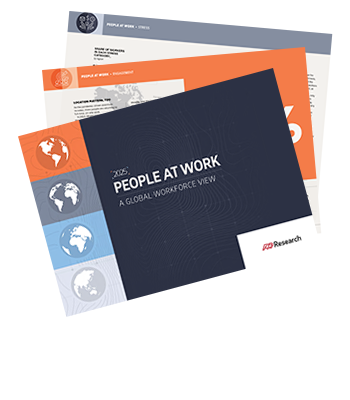People at Work: A Global Workforce View
For the past five years, ADP Research has surveyed workers around the globe to learn about their on-the-job experiences. This work has illuminated the world’s journey through a deep economic downturn, the subsequent cost-of-living crisis and monumental change tied to remote and hybrid work.
For the first time, People at Work is built on the ADP Research Global Workforce Survey, a robust study conducted annually since 2015. The survey gathers information about the labour market from the perspective of workers themselves, to provide insights that can improve the world of work by better understanding worker sentiment and expectations.
Based on survey data from nearly 38,000 working adults in 34 markets across six continents, People at Work 2025 presents the views of workers from a wide variety of industries, educational backgrounds, on-site and remote work environments and skill sets.
Download your copy of this revamped report to help you stay on the right track for today's workplace and capitalise on the opportunities that will come with the future of work.

Press releases
The lack of career opportunities has unsettled some workers globally, prompting them to seek new employers to continue advancing in their careers....
Companies need to empower their employees to adapt and thrive in this fast-evolving workforce...
Despite global employment reaching a record high in 2024, more than half (57%) of workers worldwide are living paycheck to paycheck....
According to the second study in ADP Research’s refreshed “People at Work 2025” report series, engagement in India declined to 19% in 2025, down from 24% in 2024....
Employers that invest in continued learning and on-the-job development stand to reap bottom-line benefits that go beyond having a well-prepared workforce....
Discover all our studies
People at Work: A Global Workforce View
One of the largest international studies of its kind, canvassing the views of nearly 38,000 workers in 34 markets, our research provides HR leaders with unique insights into the employee perspective - workers’ attitudes, aspirations, wants and needs.

People at Work 2024
Learn what workers of the world want employers to know.
People at Work 2024
Learn what workers of the world want employers to know.

People at Work 2023
Discover insights to better understand, motivate and retain your people.
People at Work 2023
Discover insights to better understand, motivate and retain your people.

People at Work 2022
Discover key insights to stay competitive and motivate your employees.
People at Work 2022
Discover key insights to stay competitive and motivate your employees.

People at Work 2021
Discover global worker insights a year on from the start of COVID-19.
People at Work 2021
Discover global worker insights a year on from the start of COVID-19.
Get your report now - discover key insights to better understand your workforce and transform your business.

 1. Skills development
1. Skills development
 2. Employee engagement
2. Employee engagement
 3. Stress
3. Stress
 4. Multiple jobs
4. Multiple jobs
 5. Discrimination
5. Discrimination
 6. Career barriers
6. Career barriers
 7. Artificial Intelligence
7. Artificial Intelligence
 8. Pay equity
8. Pay equity
 9. Workplace monitoring
9. Workplace monitoring









